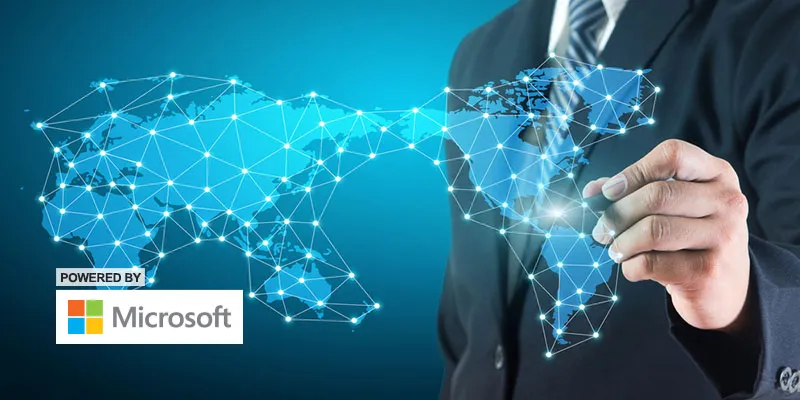Hyderabad based iBot provides ‘connected product’ experiences through their technology stack
This article is a part of CloudSparks Series sponsored by Microsoft Azure.
Azure is Microsoft’s cloud platform: a growing collection of integrated services—compute, storage, data, networking, and app—that help you move faster, do more, and save money. This powerful combination of managed and unmanaged services lets you build, deploy, and manage applications any way you like for unmatched productivity. Its enterprise-proven hybrid cloud solutions give you the best of both worlds and can quickly scale up or down to match demand. It’s also easier to build applications that span both on-premises and the cloud. With Azure, data storage, backup, and recovery become more efficient and economical.
——————————————————————————————————————————————————
With the boom in ecommerce and the success of the smartphone revolution in India, the stage is set for connected devices or Internet of Things (IoT) to capture the mindshare of both the Indian and global audiences.
iBot is a technology startup focused on enabling manufacturers, businesses and people - connect, control and engage in commerce with machines. They help manufacturers convert their physical products into subscription based services. They also help businesses and people generate intelligence through more interconnectedness.
iBot is going after the holy grail of the Internet of Things (IoT) by providing a technology stack which includes smart devices, smart wireless sensors, wireless connectivity, a smart cloud, and smart integration possibilities.

Idea to execution
iBot is Ravi Subramanian’s second venture. In 2005, he had setup an enterprise mobility company – MobileOne, which he exited in 2011. In the same year, after a delayed flight and conversation with a CEO of a large consumer durables company that he had sold software to, he decided to started iBot. Ravi says,
The conversation turned into looking at the business model of the software industry versus the consumer durables industry. At one point, I remarked that software was a one-time story and that each software product company starts all over again once the software is sold or licensed to a customer. So, it must be exciting to be a part of the consumer durables market where a certain volume of units is always sold and goals are about increasing sales by five or ten per cent.

During this dialogue Ravi realized that the consumer durables companies or manufacturers in general, were losing a lot, as all sales and services were channel driven and had no consumer connect. This resulted in misplaced warranties and losses due to service issues. He adds, “The problem was in fact so pronounced in the industry that the CEO put a dollar value on the table for this problem to be solved.”
He started iBot with the objective of connecting manufacturers and owners of products/machines with themselves, thereby enabling two-way chatter which would lead to improved efficiencies and better consumer satisfaction.
Prior to his entrepreneurial pursuits, Ravi worked with SAP AG in Germany, in a range of functions and responsibilities for close to 10 years. Ravi is an industrial engineer, a chartered financial analyst, and also has an MBA. Currently, in iBot, he has a team of 25 working with him in Hyderabad.
Growth Story
iBot considers itself to be a full stack company as they work with manufacturers and owners of products/machines (B2B) as well as extend their reach to their consumers (B2B2C).
They were initially bootstrapped until they closed their R&D (2011 to 2014) and raised a limited Series-A funding in Q4, 2014, from an IoT focused private equity firm in Luxembourg. iBot is also a Microsoft Ventures portfolio company. Ravi explains,
Our engagement with Microsoft Ventures has been more than helpful in many ways. Our choice of using the Microsoft Azure platform in our early days, in 2012, endeared us to the Microsoft Enterprise and related groups quickly. Microsoft Ventures and MS Corp have helped us connect deeper into the industry and are continuing to do so even today.
Ravi feels that the competition in this sector is more mindshare related, and their targets are large enterprises with manufacturing/operating capabilities and who have been in their respective businesses for decades. He adds, “Each of these companies have identified the problem of not being interconnected and have attempted to solve this in numerous ways. We have found a cost effective and scalable way, given that we had a clean slate to work with.”
Challenges faced and overcoming them
iBot’s major hurdle was to design a platform that could be used for multiple purposes; and especially, one that could connect with any kind of product or machine. Till then, most electronic devices were designed for single or specific purposes only, such Xbox for gaming, a WiFi router for hotspots, etc. So they spent time in solving and perfecting their solution till 2013.
They found that most electronic device manufacturers do not care about security at the hardware level. Ravi adds, “Software stacks are employed to take care of encryption or other security related matters. When you talk about connecting physical objects that can perform autonomous functions (doors, access gates, refrigerators, power generators, etc.), the thought of an intrusion is potentially more dangerous, when compared to a virus attack on your email.” So they had to ensure that industrial grade technology was deployed, and security was part of the design and not an afterthought. Ravi admits that their current scale and capabilities are not completely by design,
Thanks to cloud computing and platforms such as Azure, we are able to design software which can expand dynamically and address the needs of potentially millions of machines now telling us what they are doing, and if they need any attention.
Learnings and future plans
From his experience in the IoT sector for many years, Ravi shares these words of advice from his entrepreneurial journey:
1. While prototyping is important, don't let the prototype define the architecture.
2. Your customers may not be subject matter experts. As someone building such systems, ensure that you are and you can be accountable.
3. Designing enterprise/industry grade systems are critical. Ensure that you are working with the right partners.
iBots considers that their future will look like a page from a Sci-Fi movie - a world where everything and everyone is connected, in a secure manner, and newer interactions will be composed on the fly by machine intelligence and algorithms working on the cloud. He predicts that the ‘The Hive mind’ will become a reality sooner than later. Every machine will learn to tune and operate based on the ‘experience’ of other machines.
Ravi envisions, in a year from now, they will be recognised as one of the world’s pioneering companies in the IoT space - where the technology created is used for the benefit of everyone.
Website: iBot







